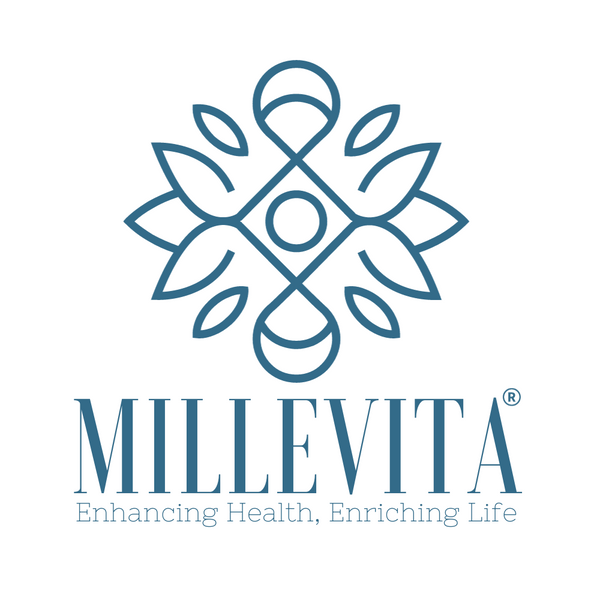

The Gut-Reset Guide: Herbal Antibacterials That Actually Work
Share
Table of Contents
Introduction
At Millevita, we believe wellness begins in the gut. This often-overlooked system does far more than digest food — it plays a central role in immunity, mood regulation, metabolism, and overall resilience.
But in today’s fast-paced world, our gut is constantly under pressure. Antibiotic overuse, poor diet, daily stress, and environmental toxins can disrupt the delicate microbial balance that keeps us well. While probiotics and fermented foods have become household staples, there's another category of support that deserves attention: herbal antibacterials.
These plant-based compounds offer a natural, intelligent way to reduce harmful overgrowths in the gut without damaging the good bacteria we need to thrive. Unlike synthetic antibiotics, they support balance — not a wipeout.
In this guide, we’ll explore eight key herbs with gut-friendly antibacterial effects, how they work, and how to use them safely in your wellness routine.
How Herbal Antibacterials Work
Inside your gut lives a vast ecosystem of bacteria, fungi, and other microbes — collectively known as the microbiome. When in balance, this community supports digestion, immune defense, mental clarity, and even hormonal health. But when that balance is disrupted, symptoms like bloating, fatigue, skin breakouts, and brain fog often follow.
Conventional antibiotics can be effective in acute situations, but they act broadly — eliminating both harmful and beneficial bacteria. This can leave your gut microbiome weakened and vulnerable.
Herbal antibacterials offer a more selective, microbiome-friendly alternative. Compounds found in plants like garlic, oregano, thyme, and berberine-rich herbs have been shown to target harmful bacteria such as H. pylori, E. coli, and Clostridium difficile, while also supporting the gut’s natural healing processes.
Many of these herbs work by disrupting bacterial communication (quorum sensing), weakening cell walls, or breaking down biofilms — protective layers that harmful microbes use to evade the immune system. The result? A more balanced gut environment without collateral damage.
Top Herbs for Gut Balance
Each of these botanicals brings something unique to gut health. They work synergistically to target harmful microbes while helping your microbiome restore its natural balance. Here's a closer look at eight of the most effective herbal antibacterials and how to incorporate them into your routine.
| Herb | Key Compound(s) | Targets | How to Use |
|---|---|---|---|
|
Garlic (Allium sativum) |
Allicin | H. pylori, Candida, bad bacteria | Raw, or in aged garlic extract capsules |
|
Oregano (Origanum vulgare) |
Carvacrol, Thymol | SIBO, parasites, bacterial overgrowth | Oregano oil softgels or diluted tincture |
|
Thyme (Thymus vulgaris) |
Thymol | Upper GI issues, bloating, mild infections | As tea, fresh in food, or liquid extract |
|
Myrrh (Commiphora myrrha) |
Sesquiterpenes, Terpenoids | Ulcers, inflamed gut lining, microbial imbalance | Tincture or blended formulas |
|
Phellodendron (Phellodendron amurense) |
Berberine | Diarrhea, gut dysbiosis, inflammation | Standardized extract (under practitioner guidance) |
|
Goldenseal (Hydrastis canadensis) |
Berberine | Yeast, gut infections, recurring imbalance | Capsules, tinctures, often paired with echinacea |
|
Cinnamon (Cinnamomum verum) |
Cinnamaldehyde, Eugenol | Gas, sugar sensitivity, unwanted microbes | Tea, in food, or supplemental powder |
|
Ginger (Zingiber officinale) |
Gingerols, Shogaols | Nausea, inflammation, microbial imbalance | Tea, capsules, or fresh in smoothies/meals |
Support Gut Health with MediHerb
These professional-grade MediHerb products support microbial balance, gut lining integrity, and digestive comfort — aligned with the herbs featured above:
Herb Comparison
Looking for a quick side-by-side breakdown? Here's how these gut-supporting herbs compare based on their primary benefits, ideal uses, and relative potency.
| Herb | Main Action | Best For | Potency |
|---|---|---|---|
| Garlic | Broad-spectrum antimicrobial | Ulcers, immune support, bad bacteria | Moderate |
| Oregano | Potent antibacterial & anti-parasitic | SIBO, Candida, gut infections | High |
| Thyme | Anti-inflammatory + antimicrobial | Upper GI relief, bloating, gas | Moderate |
| Myrrh | Healing + antibacterial | Ulcers, gut lining inflammation | Moderate |
| Phellodendron | Berberine-rich antimicrobial | Diarrhea, dysbiosis, inflammation | High |
| Goldenseal | Antimicrobial + immune modulator | Yeast, gut overgrowth, sluggish digestion | High |
| Cinnamon | Anti-bloating + microbial regulator | Gas, sugar balance, mild infections | Low to Moderate |
| Ginger | Soothing + anti-nausea | Digestive tension, travel support | Low |
How to Use These Herbs in Real Life
Knowing which herbs help is only part of the equation — the real magic happens in how you use them. A targeted, balanced routine helps you get results without overwhelming your system.
Smart Ways to Use Herbal Antibacterials:
- 🌀 Rotate your herbs: Use one herb for 2–3 weeks, then switch. This prevents resistance and supports microbial diversity.
- ⚖️ Balance with probiotics: Introduce probiotic foods or supplements alongside herbal protocols to replenish good bacteria.
- 🥗 Add prebiotic foods: Fiber-rich foods like garlic, onions, leeks, and chicory root feed your beneficial microbes.
- ⏰ Time them intentionally: Strong herbs like oregano or berberine work best between meals. Gentler ones like ginger or cinnamon can be taken with food.
- 🩺 Consult your practitioner: Herbs like goldenseal, berberine, and myrrh are potent and may interact with medications or conditions. Always use under guidance if unsure.
These herbs aren't meant for indefinite use. Instead, reach for them during gut resets, after antibiotics, following travel, or when symptoms suggest imbalance.
Final Thoughts
Gut health isn’t just about what you add — it’s about what you balance. Herbal antibacterials offer a smarter, more supportive way to restore harmony in your digestive system without wiping out the good guys. Whether you're recovering from antibiotics, managing symptoms of overgrowth, or simply optimizing your microbiome, these plant-powered tools can play a key role.
Start small. Be consistent. And always listen to your body. When used wisely, herbs like garlic, oregano, thyme, and berberine-rich botanicals can help reset, protect, and strengthen your gut over time — naturally.
If you’re dealing with chronic symptoms or taking medications, speak with a practitioner before starting any new supplements. Every gut is different, and the right support should always fit your individual needs.
Disclaimer
This article is for educational purposes only and is not intended to diagnose, treat, cure, or prevent any disease. Always consult a qualified healthcare professional before making changes to your diet, training, or supplement routine. For full details, please see our Health Disclaimer & Liability Notice .
References
- Bayan, L., Koulivand, P. H., & Gorji, A. (2014). Garlic: a review of potential therapeutic effects. Avicenna Journal of Phytomedicine, 4(1), 1–14. Link (Retrieved September 7, 2025)
- Baser, K. H. C. (2008). Biological and pharmacological activities of carvacrol and carvacrol bearing essential oils. Current Pharmaceutical Design, 14(29), 3106–3119. Link (Retrieved September 7, 2025)
- Imenshahidi, M., & Hosseinzadeh, H. (2016). Berberine and barberry (Berberis vulgaris): A clinical review. Phytotherapy Research, 30(11), 1745–1764. Link (Retrieved September 7, 2025)
- O’Mahony, L., et al. (2005). Probiotic impact on microbiota in irritable bowel syndrome. Gastroenterology, 128(3), 541–551. Link (Retrieved September 7, 2025)
- Salehi, B., et al. (2019). Medicinal plants and natural products in the treatment of gastrointestinal diseases. Journal of Gastroenterology, 54(6), 387–402. Link (Retrieved September 7, 2025)






